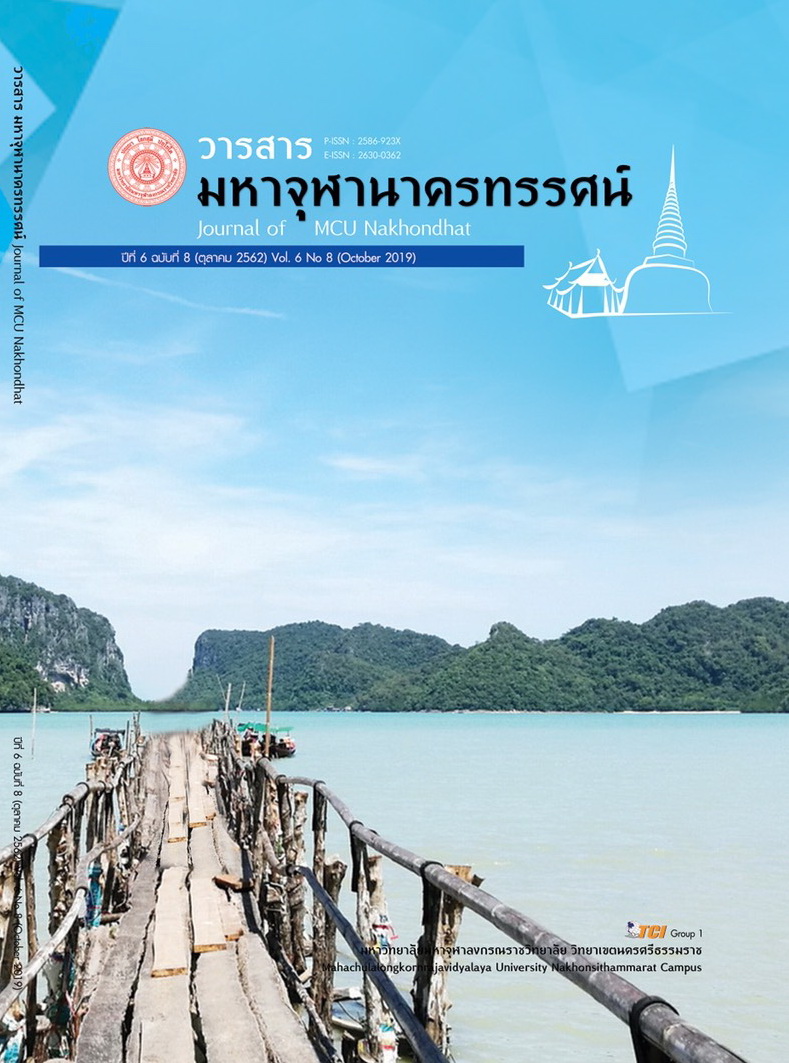THE INTEGRATION OF THE BUDDHIST DOCTRINES TO THE NEW THEORY AGRICULTURE CONCERNING TO THE KING’S PHILOSOPHY
Main Article Content
Abstract
This research has 3 objectives: 1) to study the new theory agriculture concerning to the King’s Philosophy. 2) to study the Buddhist doctrines promoting the new theory agriculture concerning to the King’s Philosophy. 3) to integrate of the Buddhist doctrines to the new theory agriculture concerning to the King’s Philosophy. It is a qualitative research.
The research found that:
1) The New Theory of Agriculture is the royal initiative which His Majesty King Bhumibol Adulyadej, King Rama IX, gave to Thai farmers to improve their quality of lives by management of soil and water resources for agriculture in a small land for maximum benefit. This is way of an average risk of low-priced products, financial crisis and natural disasters. It is the sufficiency economy production process based on self-reliance without destroying the natural environment, systematic implementation plan and supporting the strength in the community 2) The Buddhist doctrines promoting the new theory agriculture are (1) Nathakarama-dhamma 10 (10 virtues which make for protection) promoting self-reliance; (2) Sangahavatthu 4 (4 bases of social solidarity, virtues making for group integration and leadership) promoting combination power; (3) Suppurisa-dhamma 7 (7qualities of a good man; virtues of a gentleman) 3) promoting development The Integration of the Buddhist doctrines to the New theory agriculture concerning to the King’s Philosophy can be divided as follows: 1) Dimension of self-reliance – the farmers are diligent, patient, self-sufficient, conscious, and able to work with respect for the nature and the environments. 2) Dimension of combination power - the farmers can share, help, and work together with warmth, generosity, honesty, supporting community and focusing on participation in community. 3) Dimension of development - the farmers are confident in what they are doing, able to have clear goals and know how to manage the area to make the most benefit, able to know how to increase the value of agricultural products, able to live moderately, able to know the proper time, able to know the communities and respect the opinions of others as well.
Article Details
References
ดลพัฒน์ ยศธร. (2542). รูปแบบการศึกษาเพื่อการพัฒนาที่ยั่งยืนตามแนวพุทธศาสตร์. ใน ดุษฎีนิพนธ์ครุศาสตรดุษฎีบัณฑิต สาขาวิชาพัฒนศึกษา. จุฬาลงกรณ์มหาวิทยาลัย.
พัฒนา สุขประเสริฐ. (2558). ก้าวย่างจากเกษตรทฤษฎีใหม่ สู่เศรษฐกิจพอเพียงเพื่อการพัฒนาที่ยั่งยืน. กรุงเทพมหานคร: ภาควิชาส่งเสริมและนิเทศศาสตร์เกษตร คณะเกษตรมหาวิทยาลัยเกษตรศาสตร์ บางเขน.
นายนนทกร พุ่มกล่อม. (11 กุมภาพันธ์ 2562). เกษตรทฤษฎีใหม่ในมิติด้านการพัฒนาก้าวหน้า. (พระมหาวีระศักดิ์ อภินนฺทเวที, ผู้สัมภาษณ์)
ภัทรพร สิริกาญจน. (2536). หน้าที่ของพระสงฆ์ตามพุทธบัญญัติ แนวคิดและบทบาทของพระคำเขียน สุวณฺโณ ในการพัฒนาชุมชน. กรุงเทพมหานคร: สถาบันไทยคดีศึกษา มหาวิทยาลัยธรรมศาสตร์.
มนูญ มุกข์ประดิษฐ. (2547). การศึกษาวิเคราะห์ปรัชญาเศรษฐกิจพอเพียงอันเนื่องมาจากพระราชดําริ กับหลักธรรมในพระพุทธศาสนา. ใน ดุษฎีนิพนธ์พุทธศาสตรดุษฎีบัณฑิต สาขาวิชาพระพุทธศาสนา. มหาวิทยาลัยมหาจุฬาลงกรณราชวิทยาลัย.
รงค์ ประพันธ์พงศ์. (2550). เศรษฐกิจพอเพียงและทฤษฎีใหม่. กรุงเทพมหานคร: สถาพรบุ๊คส์.
วันชัย ตันติวิทยาพิทักษ์. (2561). ข้าวโพด สาเหตุแห่งการทำลายป่า น้ำแล้งและหมอกควันพิษ. เรียกใช้เมื่อ 16 กันยายน 2561 จาก https://www.sarakadee.com/blog/oneton/?p=1717
วีระยุทธ์ สวรรณทิพย์. (2553). ศาสตร์แห่งพระราชา แนวคิด ภูมิปัญญา นำสู่การปฏิบัติเพื่อทำคนให้เป็นคน. กรุงเทพมหานคร: ศูนย์ส่งเสริมและพัฒนาพลังแผ่นดินเชิงคุณธรรม สำนักงานบริหารและพัฒนาองค์ความรู้ มหาวิทยาลัยมหิดล.
สํานักงานคณะกรรมการพิเศษเพื่อประสานงานโครงการอันเนื่องมาจากพระราชดําริ (กปร.). (2555). จอมปราชญ์แห่งการพัฒนา. กรุงเทพมหานคร: บริษัทอมรินทร์พริ้นติ้งแอนด์พับลิชชิ่ง จำกัด (มหาชน).
สำนักข่าวไทยพีบีเอส. (2560). มะนาวล้นตลาด ราคาดิ่งลูกละ 15 - 50 สต. เรียกใช้เมื่อ 20 กันยายน 2561 จาก https://news.thaipbs.or.th/content/264992.
สำนักงานคณะกรรมการพัฒนาการเศรษฐกิจและสังคมแห่งชาติ (สศช.). (2545). แผนพัฒนาเศรษฐกิจและสังคมแห่งชาติฉบับที่ 9. กรุงเทพมหานคร: สำนักงานคณะกรรมการพัฒนาการเศรษฐกิจและสังคมแห่งชาติ (สศช.).


